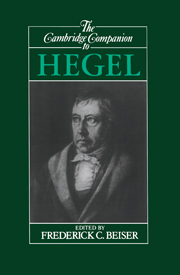Book contents
- Frontmatter
- Introduction
- 1 Hegel's intellectual development to 1807
- 2 You Can't Get There from Here
- 3 Hegel's conception of logic
- 4 Hegel's idealism
- 5 Hegel's dialectical method
- 6 Thought and being
- 7 Hegel's ethics
- 8 The basic context and structure of Hegel's Philosophy of Right
- 9 Hegel's historicism
- 10 Hegel on religion and philosophy
- 11 Hegel's aesthetics
- 12 Transformations of Hegelianism, 1805-1846
- 13 Hegel and Marxism
- 14 Hegel and analytic philosophy
- Bibliography
- Chronology
- Index
5 - Hegel's dialectical method
Published online by Cambridge University Press: 28 May 2006
- Frontmatter
- Introduction
- 1 Hegel's intellectual development to 1807
- 2 You Can't Get There from Here
- 3 Hegel's conception of logic
- 4 Hegel's idealism
- 5 Hegel's dialectical method
- 6 Thought and being
- 7 Hegel's ethics
- 8 The basic context and structure of Hegel's Philosophy of Right
- 9 Hegel's historicism
- 10 Hegel on religion and philosophy
- 11 Hegel's aesthetics
- 12 Transformations of Hegelianism, 1805-1846
- 13 Hegel and Marxism
- 14 Hegel and analytic philosophy
- Bibliography
- Chronology
- Index
Summary
The dialectical method is pervasive in Hegel's mature philosophy. It governs all three parts of his system proper: the Logic, the Philosophy of Nature, and the Philosophy of Spirit. And it also governs the discipline that he developed as an introduction to this system, the Phenomenology of Spirit (expounded in the book of that name).
Few aspects of Hegel's thought have exerted as much influence or occasioned as much controversy as this method. Yet, paradoxically, it remains one of his least well understood philosophical contributions. The aim of this essay is to cast a little light where there remains much darkness.
It seems to me that three main shortcomings in the secondary literature have hindered a clear understanding of the method. First, most interpreters, if not actually denying that there is such a thing as the dialectical method, have at least characterized it in terms that remain too vague. Second, interpreters have generally made too little effort to explain the method's philosophical motivation. Third, many critics have been too hasty in dismissing the method as guilty of one or more of a variety of original sins that would render it useless in principle, such as violating the law of contradiction.
- Type
- Chapter
- Information
- The Cambridge Companion to Hegel , pp. 130 - 170Publisher: Cambridge University PressPrint publication year: 1993
- 36
- Cited by

